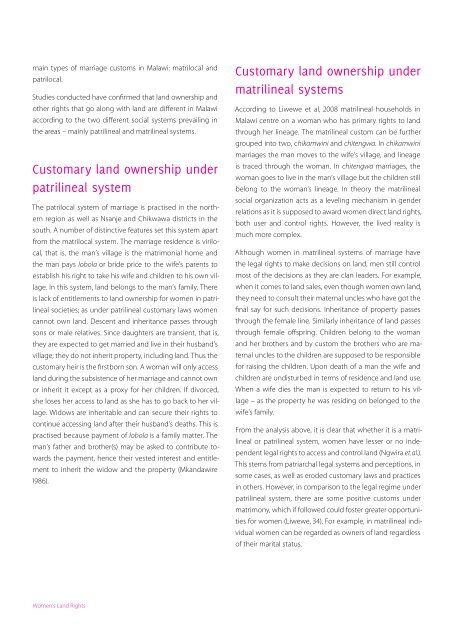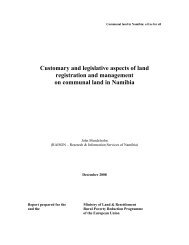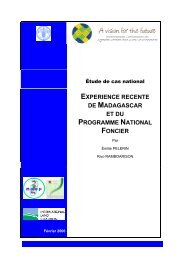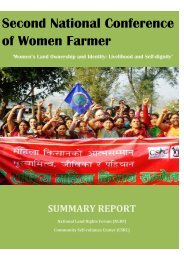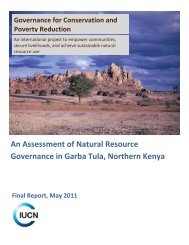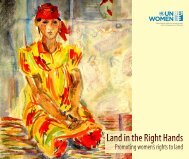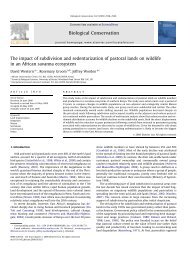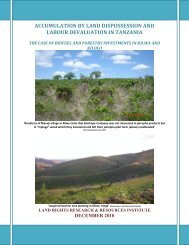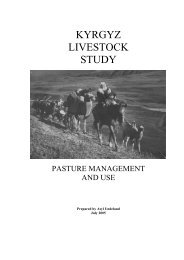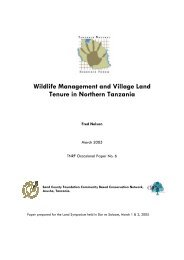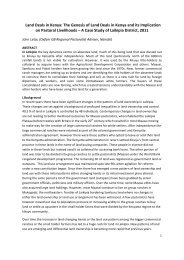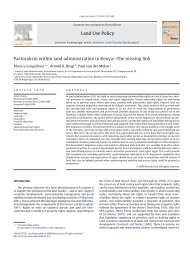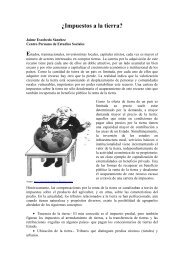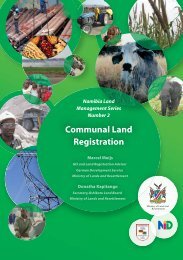Women's access to land and household bargaining power
Women's access to land and household bargaining power
Women's access to land and household bargaining power
You also want an ePaper? Increase the reach of your titles
YUMPU automatically turns print PDFs into web optimized ePapers that Google loves.
main types of marriage cus<strong>to</strong>ms in Malawi: matrilocal <strong>and</strong><br />
patrilocal.<br />
Studies conducted have confirmed that <strong>l<strong>and</strong></strong> ownership <strong>and</strong><br />
other rights that go along with <strong>l<strong>and</strong></strong> are different in Malawi<br />
according <strong>to</strong> the two different social systems prevailing in<br />
the areas – mainly patrilineal <strong>and</strong> matrilineal systems.<br />
Cus<strong>to</strong>mary <strong>l<strong>and</strong></strong> ownership under<br />
patrilineal system<br />
The patrilocal system of marriage is practised in the northern<br />
region as well as Nsanje <strong>and</strong> Chikwawa districts in the<br />
south. A number of distinctive features set this system apart<br />
from the matrilocal system. The marriage residence is virilocal,<br />
that is, the man’s village is the matrimonial home <strong>and</strong><br />
the man pays lobola or bride price <strong>to</strong> the wife’s parents <strong>to</strong><br />
establish his right <strong>to</strong> take his wife <strong>and</strong> children <strong>to</strong> his own village.<br />
In this system, <strong>l<strong>and</strong></strong> belongs <strong>to</strong> the man’s family. There<br />
is lack of entitlements <strong>to</strong> <strong>l<strong>and</strong></strong> ownership for women in patrilineal<br />
societies; as under patrilineal cus<strong>to</strong>mary laws women<br />
cannot own <strong>l<strong>and</strong></strong>. Descent <strong>and</strong> inheritance passes through<br />
sons or male relatives. Since daughters are transient, that is,<br />
they are expected <strong>to</strong> get married <strong>and</strong> live in their husb<strong>and</strong>’s<br />
village; they do not inherit property, including <strong>l<strong>and</strong></strong>. Thus the<br />
cus<strong>to</strong>mary heir is the firstborn son. A woman will only <strong>access</strong><br />
<strong>l<strong>and</strong></strong> during the subsistence of her marriage <strong>and</strong> cannot own<br />
or inherit it except as a proxy for her children. If divorced,<br />
she loses her <strong>access</strong> <strong>to</strong> <strong>l<strong>and</strong></strong> as she has <strong>to</strong> go back <strong>to</strong> her village.<br />
Widows are inheritable <strong>and</strong> can secure their rights <strong>to</strong><br />
continue <strong>access</strong>ing <strong>l<strong>and</strong></strong> after their husb<strong>and</strong>’s deaths. This is<br />
practised because payment of lobola is a family matter. The<br />
man’s father <strong>and</strong> brother(s) may be asked <strong>to</strong> contribute <strong>to</strong>wards<br />
the payment, hence their vested interest <strong>and</strong> entitlement<br />
<strong>to</strong> inherit the widow <strong>and</strong> the property (Mk<strong>and</strong>awire<br />
1986).<br />
Women’s L<strong>and</strong> Rights<br />
Cus<strong>to</strong>mary <strong>l<strong>and</strong></strong> ownership under<br />
matrilineal systems<br />
According <strong>to</strong> Liwewe et al, 2008 matrilineal <strong>household</strong>s in<br />
Malawi centre on a woman who has primary rights <strong>to</strong> <strong>l<strong>and</strong></strong><br />
through her lineage. The matrilineal cus<strong>to</strong>m can be further<br />
grouped in<strong>to</strong> two, chikamwini <strong>and</strong> chitengwa. In chikamwini<br />
marriages the man moves <strong>to</strong> the wife’s village, <strong>and</strong> lineage<br />
is traced through the woman. In chitengwa marriages, the<br />
woman goes <strong>to</strong> live in the man’s village but the children still<br />
belong <strong>to</strong> the woman’s lineage. In theory the matrilineal<br />
social organization acts as a leveling mechanism in gender<br />
relations as it is supposed <strong>to</strong> award women direct <strong>l<strong>and</strong></strong> rights,<br />
both user <strong>and</strong> control rights. However, the lived reality is<br />
much more complex.<br />
Although women in matrilineal systems of marriage have<br />
the legal rights <strong>to</strong> make decisions on <strong>l<strong>and</strong></strong>, men still control<br />
most of the decisions as they are clan leaders. For example,<br />
when it comes <strong>to</strong> <strong>l<strong>and</strong></strong> sales, even though women own <strong>l<strong>and</strong></strong>,<br />
they need <strong>to</strong> consult their maternal uncles who have got the<br />
final say for such decisions. Inheritance of property passes<br />
through the female line. Similarly inheritance of <strong>l<strong>and</strong></strong> passes<br />
through female offspring. Children belong <strong>to</strong> the woman<br />
<strong>and</strong> her brothers <strong>and</strong> by cus<strong>to</strong>m the brothers who are maternal<br />
uncles <strong>to</strong> the children are supposed <strong>to</strong> be responsible<br />
for raising the children. Upon death of a man the wife <strong>and</strong><br />
children are undisturbed in terms of residence <strong>and</strong> <strong>l<strong>and</strong></strong> use.<br />
When a wife dies the man is expected <strong>to</strong> return <strong>to</strong> his village<br />
– as the property he was residing on belonged <strong>to</strong> the<br />
wife’s family.<br />
From the analysis above, it is clear that whether it is a matrilineal<br />
or patrilineal system, women have lesser or no independent<br />
legal rights <strong>to</strong> <strong>access</strong> <strong>and</strong> control <strong>l<strong>and</strong></strong> (Ngwira et.al.).<br />
This stems from patriarchal legal systems <strong>and</strong> perceptions, in<br />
some cases, as well as eroded cus<strong>to</strong>mary laws <strong>and</strong> practices<br />
in others. However, in comparison <strong>to</strong> the legal regime under<br />
patrilineal system, there are some positive cus<strong>to</strong>ms under<br />
matrimony, which if followed could foster greater opportunities<br />
for women (Liwewe, 34). For example, in matrilineal individual<br />
women can be regarded as owners of <strong>l<strong>and</strong></strong> regardless<br />
of their marital status.


